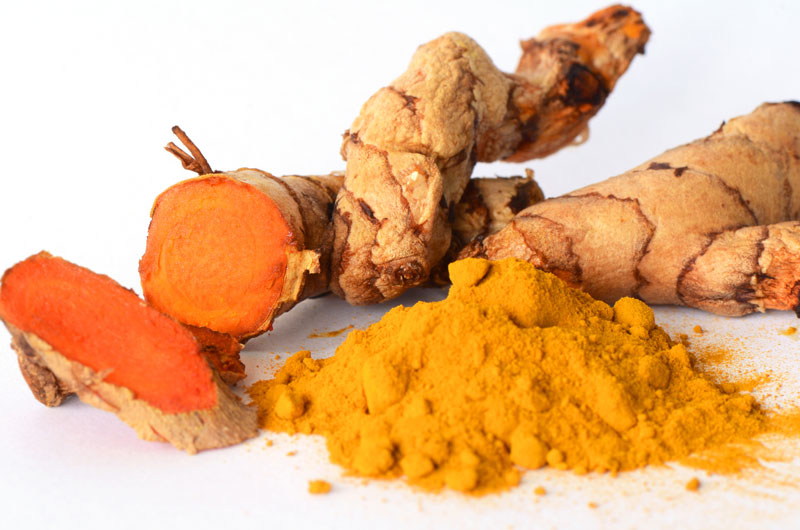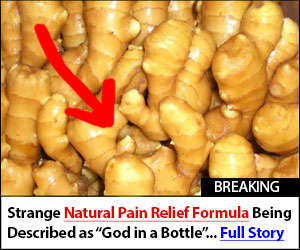
Turmeric has been hitting health news headlines for the past few years as one of the most powerful antioxidants you never knew you needed. But what’s so special about this yellowish-orange root, anyway?
Turmeric has been used by Indian and Asian cultures for thousands of years for dyes, spices, and its medicinal properties. It is even considered holy and is used in major religious ceremonies and weddings.
And after millennia of healing the widest range of ailments–from the chicken pox to ankle sprains, liver disorders to gastrointestinal distress–modern science has taken notice.
It’s curcumin–turmeric’s active ingredient responsible for the flavor of curry–that has been under serious scientific scrutiny for the past 25 years or so.
Here are six huge discoveries that researchers have made recently about this powerful little spice.
The 6 Major Health Benefits of Turmeric (Curcumin)
6. Curcumin could prevent obesity
Researchers from Tufts University in Boston studied the effects of turmeric on mice fed a 22 percent fat diet. The curcumin kept blood vessels from developing in fat tissue (helpful in preventing obesity) and increased fat metabolism.
5. As effective as Prozac in treating depression
A July 2013 study compared the efficacy of 1,000mg of curcumin against (and in combination with) fluoxetine, a popular antidepressant. The researchers found that all three options performed almost equally in relieving depressive symptoms. Plus, curcumin showed absolutely no side effects and was “tolerated well” by all participants.
4. Curcumin reduces diabetes risk and diabetic symptoms
A study published in July 2012 showed that using turmeric could prevent pre-diabetes from becoming full-blown diabetes by taking 250mg of curcuminoid supplements for 9 months. But, it not only prevented diabetes… it increased the function of beta cells, which allow the pancreas to release insulin.
Even those diagnosed with diabetes can still get benefits from supplementing with turmeric. Harbin Medical University in China showed that taking 300mg of curcumin daily for three months lowered blood sugar and increased insulin sensitivity.
3. Protects against Parkinson’s disease
The generally recognized cause of Parkinson’s disease is twofold: too little dopamine production (caused by cell death of dopamine producers) and deposits of protein “clumps” in brain neurons.
One common cause of cell death is toxic exposure to pesticides, such as rotenone, and other environmental poisons. An October 2013 study showed that curcumin both offered protection against cell death and reduced the impact of the rotenone toxicity.
Another research group at Michigan State University determined early in 2012 that slow-moving proteins called alpha-synucleins clump together, which also contributes to the onset of Parkinson’s. They went on to demonstrate that curcumin binds to the proteins, increases their speed, and thus keeps them from aggregating in the brain.
2. Turmeric protects against multiple types of cancer and organ damage from conventional treatments
Liver cancer and liver damage: Another October 2013 study published in Molecular Biology Reports stated that curcumin significantly reduced four markers of inflammation in the liver after animals were given curcumin. Plus, it increased levels of inflammation-fighting antioxidant enzymes, protecting it from damage.
Makes ovarian cancer cells more susceptible to drugs: Researchers from the Sanford School of Medicine in South Dakota showed that pre-treating ovarian cancer cells with curcumin reduced the dose of cisplatin (an anti-cancer drug containing platinum) and radiation required to stop the growth of the tumor cells.
Prevents breast and prostate cancers from metastasis (spreading to other organs): Both breast and prostate cancers are often directly related to inflammation. One study in Munich showed that curcumin reduced pro-inflammatory molecules, especially inflammatory cytokines, which would keep the cancers from spreading by as much as 68%.
Another group of researchers in Texas confirmed that curcumin increases the effects of Taxol (a chemotherapy drug) and prevented breast cancer spreading to the lungs in mice.
The same sensitizing effect has been seen in practically every cancer of the body: colon, pancreas, gastric, blood, lung, prostate, bladder, cervix, head and neck and brain cancers and in multiple myeloma, leukemia and lymphoma. It works similarly for radiation. Amazingly, curcumin has also been shown to protect normal organ tissue from the damaging effects of chemo and radiation.
1. Curcumin significantly reduces ALL pain caused by inflammation.
This incredible ingredient has proven to be an incredibly effective anti-inflammatory.
It works by inhibiting multiple pro-inflammatories, including COX-2, prostaglandins, nitric oxide, tumor necrosis factor and interleukin-12. That makes it effective against all other inflammatory diseases I haven’t listed here (like IBD, Crohn’s disease, ulcerative colitis and atherosclerosis.)
That also includes chronic pain, which is most often caused by such pro-inflammatories as COX-2 and prostaglandins. One study showed that curcumin is far safer, more precise, and had fewer side effects than aspirin for shutting down inflammation responsible for chronic pain.
References:
Amanda F. Turmeric – Curcumin – An Anti-inflammatory Superfood. Holistic Kenko 2017 Jul 20
Qualls Z. Protective Effects of Curcumin Against Rotenone and Salsolinol-Induced Toxicity: Implications for Parkinson’s Disease. Neurotoxicity Research. 2013 Oct. 10.
Huang CZ. In vivo study on the effects of curcumin on the expression profiles of anti-tumour genes (VEGF, CyclinD1 and CDK4) in liver of rats injected with DEN. Molecular Biology Reports. 2013 Oct 11.
Chuengsamarn S. Curcumin Extract for Prevention of Type 2 Diabetes. Diabetes Care. 2012 July 6.
Yallapu M. Curcumin induces chemo/radio-sensitization in ovarian cancer cells and curcumin nanoparticles inhibit ovarian cancer cell growth. Journal of Ovarian Research. 2010 April 29.
Bachmeier B. The chemopreventive polyphenol Curcumin prevents hematogenous breast cancer metastases in immunodeficient mice. Cellular Physiology and Biochemistry. 2007;19(1-4):137-52.
Aggarwal B. Curcumin Suppresses the Paclitaxel-Induced Nuclear Factor-κB Pathway in Breast Cancer Cells and Inhibits Lung Metastasis of Human Breast Cancer in Nude Mice. Clinical Cancer Research. 2005 Oct. 15.
Ejaz A. Curcumin inhibits adipogenesis in 3T3-L1 adipocytes and angiogenesis and obesity in C57/BL mice. Journal of Nutrition. 2009 May;139(5):919-25.
Ahmad B. Curcumin prevents aggregation in α-synuclein by increasing reconfiguration rate. Journal of Biological Chemistry. 2012 Mar 16;287(12):9193-9.
Sanmukhani J. Efficacy and Safety of Curcumin in Major Depressive Disorder: A Randomized Controlled Trial. Phytotherapy Research. 2013 Jul 6.
Goel A. Curcumin, the golden spice from Indian saffron, is a chemosensitizer and radiosensitizer for tumors and chemoprotector and radioprotector for normal organs. Nutrition and Cancer. 2010;62(7):919-30.
Hong J, Bose M, Ju J, Ryu JH, Chen X, Sang S, Lee MJ, Yang CS. Modulation of arachidonic acid metabolism by curcumin and related beta-diketone derivatives: effects on cytosolic phospholipase A(2), cyclooxygenases and 5-lipoxygenase. Carcinogenesis. 2004 Sep;25(9):1671-9.




I am on a Blood Thinner. I can’t eat Certain things.
I am on blood thinners does this have any effect on me does it have any grapefruit juice in it I am on bisoprolol 5mg.
We can not suggest or support the use of Heal n Soothe if you are taking a Blood Thinner. Sorry
Thanks
Steve